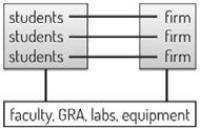Research-based Design as Translational Research between the Academy and Practice

Outlining several models for aligning academic architectural research with the needs of practice, this paper focuses on the advantages and challenges in using graduate-level building science coursework as a vehicle for translational research. The term translational research is borrowed from medicine and refers to taking current laboratory research and tools and applying them to practice. In 2012 and 2013, faculty members in the School of Architecture at Portland State University were awarded an NCARB grant to generate translational building science research in collaboration with local architecture firms. This grant transformed traditional lecture-based building science and technology courses into a series of ongoing, graduate level seminars that revolve around two primary activities: (1) architecture and engineering students conduct building science research of relevance to a project currently under design in a firm, and (2) students are embedded in project teams where they attend all interdisciplinary meetings for the course of a term to witness and document interdisciplinary collaboration. This paper highlights the lessons learned from these pilot seminars, including what types of research projects have been most fruitful for the students and practitioners and how these courses could be a model for building science education elsewhere.
keywords: Research-Based Design, Translational Research


Add comment
Log in to post comments